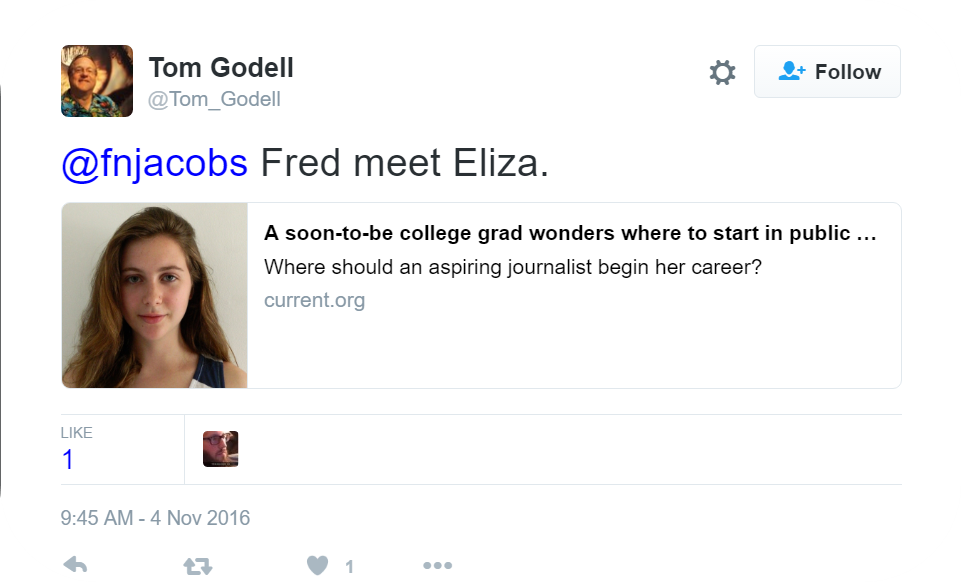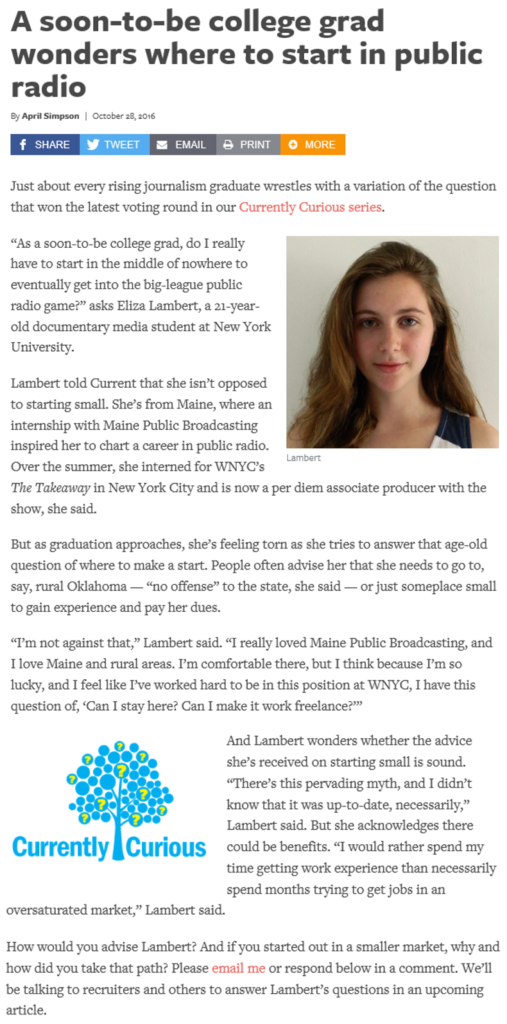It’s a dilemma as old as radio itself: how to break into the business.
After last week’s post about College Radio Day, I’ve been thinking a lot about radio’s need for an influx of young talent, contrasted with the problem that young people often experience about getting that first job.
But it runs deeper than that because just nailing down a position inside a radio station – public or commercial – is no guarantee of a smart, strategic career path. Not every job, company, or organization is a good one, and not every opportunity truly allows young people to experience what radio is truly all about.
So when WUKY’s Tom Godell sent me this tweet last Friday, it got my attention:
 I read the story in Current (a public media industry trade publication) by April Simpson, and I’ve included it below. Eliza Lambert’s conundrum is about where to start. She already has her foot into the door at WNYC – what many consider to be the finest public radio station in the country. But others are advising her to take a small market job where she could ostensibly learn everything – and then work her way up the ladder.
I read the story in Current (a public media industry trade publication) by April Simpson, and I’ve included it below. Eliza Lambert’s conundrum is about where to start. She already has her foot into the door at WNYC – what many consider to be the finest public radio station in the country. But others are advising her to take a small market job where she could ostensibly learn everything – and then work her way up the ladder.
Here’s Eliza’s story:
 So, Tom – and Eliza – here’s my “take” on this dilemma.
So, Tom – and Eliza – here’s my “take” on this dilemma.
First of all, there is no “right” (or “wrong”) answer here. Although she has been advised that she’s facing a Hobson’s Choice – meaning it’s an either/or question like the Presidential election – the reality is that whether she goes for the big market station or downsizes to a smaller operation, the result could vary greatly.
As most broadcast veterans will tell you, happenstance, serendipity, and luck (both the good and bad varieties) seem to always play a starring role in career advancement. That’s not just the case with newcomers to the business. I would bet that even people who have worked in the radio industry for decades are nodding their heads about the strange and unpredictable ways they’ve made their way from job to job, and market to market.
That’s because so much of what happens along the way is simply impossible to forecast. Plan as you will, you cannot prevent “global circumstances,” like a station sale, a supervisor getting fired (or moving on), or any number of things that never come up during the job interview.
That’s why to reduce your question to a “small market vs. big market” question fails to take into account perhaps the most important variable in the mix: people. Rather than look at how one circumstance has advantages over the other due to market size, maybe the more important variable is sizing up the person or team you’ll be reporting to and working with. What are they about? Are they listening to you and your career ideas? Are they giving you indicators that you’ll learn a ton from smart staffers, but also be in a position to test out your skills?
I can imagine a situation at a prestigious major market station where you’re cubbyholed in a department where you can’t break out and get a full look at the overall station operation. And I can also visualize a smaller market station being dysfunctional, quirky, and just not a place where great examples are being set, thus preventing you from learning “the right way” to do radio. Depending on the people who run the show, your experience can vary greatly.
Sometimes we tend to be overly analytical about our plans, leading us down a path that seems logical, but that somehow fails to satisfy and deliver. And then there are other times where a hunch about a boss or a station can pay off in a big way.
You’re young, and in a position where even if you end up making a miscalculation or things just don’t work out as you’d hoped, you can still pick yourself up, and move on to a situation that’s more nurturing, educational, and rewarding.
So credit where credit’s due. You’re asking a lot of the right questions, and thinking it through. Hearing about other people’s jobs has some value (and there are a number of interesting comments in the Current story), but in the end, the only ones that matter are those that you experience yourself.
Developing good instincts is one of the best skills you can acquire. You won’t get them all right, of course, but some of the most successful people in both commercial and public radio will tell you that it often comes down to making a good call, crossing your fingers, and then making the best of it.
So, in others words, trust your gut.
P.S. Assuming you make a good choice, my second piece of advice to you is become indispensable in the organization. Marketer Seth Godin wrote the book on the subject, Linchpin. It’s a primer about what it takes to stand out, out-perform, and become a true asset to the station. This is more than about paying your dues. It is dedicating yourself to becoming that impossible-to-ignore person, and letting your passion shine through. Good luck.
- Like A Pair Of Old Jeans - April 2, 2025
- What’s Fair Is Fair - April 1, 2025
- What’s On Your Bucket List? - March 31, 2025




Over all I would say that each person has their own path to trod when it comes to career development. If I was starting over it would be hard to arrange some of the good luck or right place right time events that are part of my resume. I do have a few words of advice to the beginners. If you are in New York or another big market that you like but you are just an intern or in some back room doing something that is not developing your career dreams then do this. Ask your direct supervisor for a sit down chat about the chances for advancement at the station and what it would take to get there. Understand that you may not get a chance at New York again or you may after five or ten years of honing your craft. I found the tour of small markets instrumental in developing my on air style to a certain degree and you will know when it’s time to bust out. The draw backs are loneliness in places where you don’t know anyone. The most enduring memories for me are the sometimes mean spirited people who will take advantage of you along the way. On the upside you can meet mentors and fellow seekers who will be your contacts in later life. Good luck ………..
Dan, worldly advice from someone who’s experienced a great deal over these years, and enjoys sharing those lessons. It’s not always pretty, but a reflection of the highs and lows of the industry. Thanks.
Mike Tyson probably said it best when it comes to giving career advice: “Everybody has a plan until they get punched in the mouth.”
Life is part hard work and part luck.
As an industry, I believe radio needs to start recruiting its future talent before college. I wrote about this here: https://dicktaylorblog.com/2016/10/23/where-you-should-be-recruiting-radio-talent/
One thing that will always be true, the harder you work the luckier you’ll get.
And I agree with you Fred, Seth Godin’s book LINCHPIN is must reading. I use it in my broadcast capstone class at the university.
And that punch in the mouth is inevitable, sooner or later. Thanks for the perspective and the comment, Dick – always appreciated.